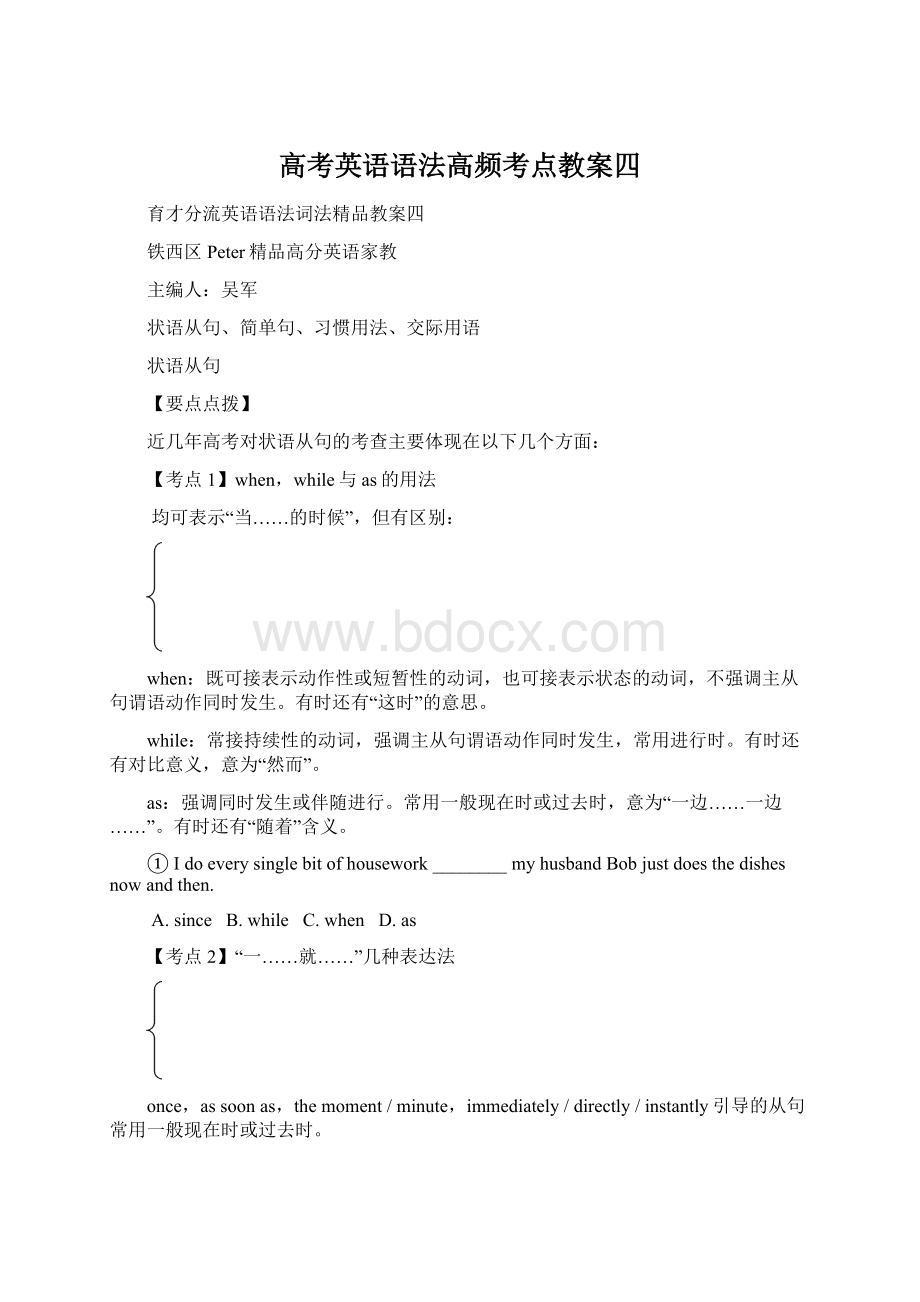高考英语语法高频考点教案四.docx
《高考英语语法高频考点教案四.docx》由会员分享,可在线阅读,更多相关《高考英语语法高频考点教案四.docx(181页珍藏版)》请在冰豆网上搜索。

高考英语语法高频考点教案四
育才分流英语语法词法精品教案四
铁西区Peter精品高分英语家教
主编人:
吴军
状语从句、简单句、习惯用法、交际用语
状语从句
【要点点拨】
近几年高考对状语从句的考查主要体现在以下几个方面:
【考点1】when,while与as的用法
均可表示“当……的时候”,但有区别:
when:
既可接表示动作性或短暂性的动词,也可接表示状态的动词,不强调主从句谓语动作同时发生。
有时还有“这时”的意思。
while:
常接持续性的动词,强调主从句谓语动作同时发生,常用进行时。
有时还有对比意义,意为“然而”。
as:
强调同时发生或伴随进行。
常用一般现在时或过去时,意为“一边……一边……”。
有时还有“随着”含义。
①Idoeverysinglebitofhousework________myhusbandBobjustdoesthedishesnowandthen.
A.sinceB.whileC.whenD.as
【考点2】“一……就……”几种表达法
once,assoonas,themoment/minute,immediately/directly/instantly引导的从句常用一般现在时或过去时。
hardly/scarcely…when…和nosooner…than…结构中,前句常用过去完成式(常用部分倒装形式),后句用过去式。
Ondoingsth.,each/every/thefirst/thelast+time后也可直接接从句,一起作时间状语。
②——DidyouremembertogiveMarythemoneyyouowedher?
——Yes.Igaveittoher_____Isawher.
A.whileB.themomentC.suddenlyD.once
【考点3】because,as,since与for的用法比较
because:
表示直接的原因或理由。
用于回答Why的问题。
because与so不能同时并列使用。
since:
表示对方已知的,无须加以说明的既成事实的理由。
译为“既然”。
as:
表示十分明显的原因,一般说明因果关系。
for:
常出现在并列句中,不说明主句行为发生的直接原因,只提供一些补充说明,且不可位于句首。
③_______youareleavingtomorrow,wecaneatdinnertogethertonight.
A.ForB.SinceC.WhenD.while
【考点4】nomatter后可接who,whom,whose,which,what,when,where,how,whether
引导的让步主语从句可用whoever,whomever,whenever,whichever,whatever,wherever,
however替换,但在ever引导其它从句时不可用nomatter引导。
④_______,Ihavetoputitawayandfocusmyattentiononstudythisweek.
A.HoweverthestudyisamusingB.Nomatteramusingthestoryis
C.HoweveramusingthestoryisD.Nomatterhowthestoryisamusing
【考点5】until/till的用法
⑤Itwas__________backhomeaftertheexperiment.
A.notuntilmidnightdidhegoB.untilmidnightthathedidn’tgo
C.notuntilmidnightthathewentD.untilmidnightwhenhedidn’tgo
⑥——Washisfatherverystrictwithhimwhenhewasatschool?
——Yes.Hehadneverpraisedhim______hebecameoneofthetopstudentsinthegrade.
A.afterB.unlessC.untilD.when
【考点6】引导让步主语从句应注意等几个问题
1.由although/though,evenif/though引导
注意although/though引导从句时,主句不能用but,但可用yet或still。
2.由whether…or(not)引导
3.由though或as引导的倒装句中。
4.though用作副词,可位于句末,并用逗号分开。
⑦——Dad,I’vefinishedmyassignment.
——Good,and_______youplayorwatchTV,youmustn’tdisturbme.
A.wheneverB.whetherC.whateverD.nomatter
【考点7】before用法
注意before在下列句型中的使用
Itwillbe+一段时间+before+从句
Itwon’tbelongbefore+从句
before一词在不同的句型中就有不同的意思,如:
“在……之前”、“过了……才”、“没……就”、“不知不觉就……”等。
⑧Itwillbealongtime_____Mr.Black______backabroad.
A.before;comesB.since;hascome
C.before;willcomeD.after;willcome
【考点8】where引导的定语从句与where引导的地点状语从句的区别
⑨——Ihavelearnedthatalargenewbuildingwillbesetup______theTwinTowersoncestood.
——SohaveI.ButtheAmericanpeoplehaven’tyetgotovertheshockofSeptember11.
A.whereB.whenC.whichD.that
【考点9】sothat可引导目的状语从句和结果状语从句
⑩Rosesneedspecialcare________theycanlivethroughwinter.
A.becauseB.sothatC.evenifD.as
【考点10】状语从句的省略用法
1.当when,while,if,unless引导状语从句时,如果主从句的主语一致,且谓语部分由be动词构成(或者从句中有itis…)时,可省略主语和be动词(或省略itis)。
2.在虚拟条件状语从句中,如果从句中有had,should,were时,可省略if,用“had,should,were+主语”形式。
3.以as,than引导的比较状语从句可全部或部分省去。
4.asif和asthough从句可用省略形式,后接不定式、分词、形容词和介词。
⑾Theresearchissodesignedthatonce____nothingcanbedonetochangeit.
A.beginsB.havingbegunC.beginningD.begun
⑿Generallyspeaking,_____accordingtothedirections,thedrughasnosideeffect.(
A.whentakingB.whentakenC.whentotakeD.whentobetaken
答案:
BBBCCCBAABDB
【各个击破】
1.________,Icouldn’tliftthebox.
A.AsImighttryB.TryalthoughImight
C.AstryImightD.TryasImight
2.Thenextmoment,_____shehadtimetorealizewhatwashappening,shewashitoverthehead.
A.whenB.beforeC.sinceD.as
3.——DoyouhaveanyideawhatHankdoesallday?
——IknowhespeaksatleastasmuchtimewatchingTVashe__________.
A.doeswritingB.writesC.iswritingD.doestowrite
4.Iftheway_____youdothejobiswrong,youwillsurelyfail____goodyourideamaybe.
A.how;howeverB./;howeverC.that;whateverD.inwhich;how
5.Shemusthavegoneoutearly,_____shehadnotshownupatbreakfast.
A.becauseB.sinceC.forD.therefore
6.Idon’tthinkyou’llbeabletounderstandthat______youaremyage.
A.evenB.onlywhenC.asifD.evenwhen
7.——Don’tlookdownuponBob.Hehasjustownadvantages.
——Oh,yes.______othersareweak,heisstrong.
A.WhenB.ThoughC.WhereD.If
8.Christiestaredangrilyatherbossandturnedaway,asthough______outoftheoffice.
A.togoB.wentC.goneD.wouldgo
9.——Excuseme,isthereagasstationaround_______Icanfillupmytank?
——Ofcourse,thereisoneattheendoftheroad.
A.thatB.inwhichC.whereD.which
10.Iwasadvisedtoarrangeforinsurance_____Ineededsomemedicaltreatment.
A.sothatB.incaseC.forfearofD.though
11.Mr.Li,thoughinabadhealth,isalwayswellprepared_______studentsattendhislecture.
A.inorderthatB.sofarasC.whoeverD.howevermany
12.Theearthgoesaroundthesun_____themoongoesaroundtheearth.
A.sothatB.justlikeC.justasD.ashow
13.Doingyourhomeworkisawaytoimproveyourtestscores,andthisisespeciallytrue_____it_____classroomtests.
A.before;getsB.as;makesC.since;takesD.when;comesto
14.Whenhereadsbooks,hishabitistomakeamark_______themeaningisuncleartohim.
A.thereB.whereverC.theplaceD.inwhich
15.Itwasnot______hetookoffhisdarkglasses_____Irealizedhewasafamousfootballstar.
A.when;thatB.until;didC.when;thenD.until;that
简单句
【要点提示】
1、感叹句:
感叹句有两个基本句式句式:
1)What+N.phrase+subject+be/v.!
这里的名词短语有以下三种可能:
a、a/an+adj.+名词单数b、adj.+名词复数c、adj.+不可数名词
e.g.Whatalovelyboyheis!
Whatsweetflowerstheyare!
Whatcoldweatheritis!
2)How+adj.+the+N.(单数、复数、不可数)+subject+be/link-v.
e.g.Howlovelytheboyis!
Howsweettheflowersare!
Howcouldtheweatheris!
Howsmooththesilkfeels!
另:
上两种感叹句可以相互转换
有时,在上下文明确的情况下,可以省略How后面的形容词。
e.g.How(fast/well)thestudentswork!
Howwell/beautifully)shesings!
2、反意疑问句:
1)反意疑问句一般遵循:
前面肯定,反意部分否定、前面否定反意部分肯定的原则。
e.g.Helikesplayingfootball,doesn’the?
Youdon’twatchTVintheevening,doyou?
注:
a、当前否后肯时,要注意它的答局的意思。
e.g.Shedoesn’tspeakEnglish,doesshe?
Yes,shedoes.(不,她讲英语的)No,shedoesn’t.(是的,不讲)
2)祈使句的反意部分用won’tyou?
/shan’twe?
或willyou?
/shallwe?
但常用willyou?
/shallwe?
e.gLendmeahand,willyou?
Letuspassthroughtheroom,willyou?
Don’tmakeanynoise,willyou?
Let’splaytennisnow,shallwe?
3)含有否定意思的副词:
hardly、no、not、never、seldom、little、scarcely等,属于准否定词,用于句中时,该句即为否定句。
e.g.HehardlygoeshomeonSundays,doeshe?
Thelittleboyseldomtellslies,doeshe?
但是像unfair、useless、impossible、dislike等词,虽然也有否定意思,但由于它们是在一个词前加前缀dis-/im-/un-等或在词后加后缀-less构成的,不属于准否定词。
当这些词用于句中时,该句并不是否定句,即:
反意部分仍然用否定式。
e.g.Youdislikethewayhespeaks,don’tyou?
Itisimpossibletofinishtheworkinthreehours,isn’tit?
4)must表示推测时,反意部分用must后面的动词的相应助动词形式。
e.g.HemustknowbothEnglishandFrench,doesn’the?
Shemusthaveknowtheanswertothequestion,hasn’tshe?
Theymusthavevisitedthefarmlastweek,didn’tthey?
注意:
a、Letme引起的祈使句,反意部分用willyou?
/won’tyou?
/mayI。
b、当陈述部分的主语是:
—body或—one构成的不定代词时,反意部分的主语用he或they;是—thing时,用it。
c、Iam…..的反意部分用aren’tI?
3、双宾语:
有些英语动词可以接双宾语,句式为:
subject+vt.+sb.(间接宾语)+sth.(直接宾语)英语中,能接双宾语的常用动词有:
ask、promise、cause、play、leave、make、do、bring、buy、reach、order、teach、offer、serve、show、tell、wish….。
e.g.CanIaskyouaquestion,Sir?
Shemademeamodelshipformybirthday.
注:
带双宾语的句子可以被改为subject+vt.+sth(直接宾语)+介词+sb.的形式。
其中的介词,常用的有:
to、for、of….。
归纳如下:
handowepaypostpromisereadreturnsendshowteach…
sth.
to
sb.
boilbuydrawchooseearnfindgatherordersavesing…
sth.
for
sb.
askrequestdemand
sth.
of/from
sb.
另还有:
playajoke/trickonsb;playagamewith/againstsb.
e.g.Excuseme,youdemandtoomuchfrom/ofme.
MayIaskaquestionofyou?
4、句型:
Subject+link-v.+n./adj.
在该句型中的系动词有特定含义,有“人称、数、时态”等形式变化。
常用的有:
显得:
look,appear,seem
变得:
become,come,fall,get,go,grow,run,turn
持续是:
continue,keep,remain,stand,stay
听(闻、尝、摸)起来:
sound,smell,taste,feel
证明是:
prove
e.g.Hiswordsprovedright.Thedishsmellswonderful.
5、有些动词不表示动作,而表示事物的特性,用主动形式表示被动含义,这类动词有:
wash,write,sell,drive,feel,hang….等。
e.g.Somepicturesarehangingonthewall.
Thiskindofcardrivesmoothandfast.
Thepenwriteswellsosellswell.
【各个击破】
1.______niceweatheritis!
Let’sgooutforawalk,shallwe?
A.HowB.HowaC.WhataD.What
2.—Nothingwrongwithit,_____?
—No.Yoursisaspecial-builtmodel.Drivecarefully,though.Ittakestimetoruninanewcar.
A.isitB.hasitC.aretheyD.isthere
3.Hehadlittleideathatitwasgettingsolate,_______?
A.didn’theB.wasn’titC.didheD.wasit
4.Pollymustbeunhappywithoutme,_____she?
A.mustB.isC.mustn’tD.isn’t
5.I’mlate,____?
A.amIB.amnotIC.aren’tID.aren’tyou
6.Let’sgotothecinema,____?
A.shallweB.willyouC.willweD.don’twe
7.——Shedidn’tcometoschoolyesterday,didshe?
——____,thoughshewasnotfeelingverywell.
A.No,shedidn’tB.Yes,shedidn’tC.No,shedidD.Yes,shedid
8.——Alice,youfeed(喂)thebirdtoday,____?
——ButIfedityesterday.
A.doyouB.willyouC.didn’tyouD.don’tyou
9.Theboyisunlikehismother,____he?
A.is